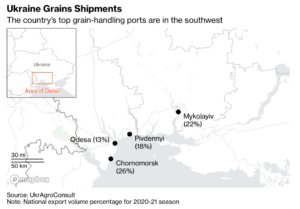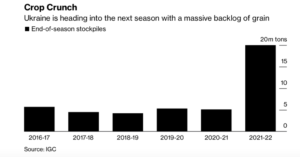Tariffs imposed by the Trump administration collected an estimated $958 million in revenue from selected agricultural inputs from February to October of 2025, according to North Dakota State University's monthly…
UN Negotiations on Ukraine Grain Exports Struggling to Make Progress
Reuters writers Tuvan Gumrukcu and Michelle Nichols reported yesterday that, “Russia on Wednesday said it has offered ‘safe passage’ for Ukraine grain shipments from Black Sea ports but is not responsible for establishing the corridors and Turkey suggested that ships could be guided around sea mines.
“Ukrainian grain shipments have stalled since Russia’s invasion and ports blockade, stoking global prices for grains, cooking oils, fuel and fertilizer. The United Nations is trying to broker a deal to resume Ukraine exports and Russian food and fertilizer exports, which Moscow says are harmed by sanctions.
“‘We are not responsible for establishing safe corridors. We said we could provide safe passage if these corridors are established,’ Russia U.N. Ambassador Vassily Nebenzia said.”

The Reuters article noted that, “‘Since the location of the mines is known, certain safe lines would be established at three ports,’ [Turkish Foreign Minister Mevlut Cavusoglu] said. He said commercial ships, using guidance of Ukrainian vessels as detailed in the plan, ‘could thus come and go safely to ports without a need to clear the mines.'”
Gumrukcu and Nichols added that, “John Kirby, a national security spokesperson at the White House, said getting grain out of Ukraine is a ‘tricky issue’ but President Joe Biden is ‘keeping an open mind.’
“‘He is doing everything he can to get that grain to market,’ Kirby told reporters. ‘We’re all mindful of the sense of urgency here. We’re working it very, very hard.'”

Bloomberg’s Alberto Nardelli reported yesterday that, “Senior European officials see little chance Russia is willing to ease global food pressures by striking a deal to let Ukraine resume crucial grain exports, saying the Kremlin views the crisis as leverage against Kyiv and its allies.
Government and intelligence officials say United Nations-facilitated negotiations with Moscow and Kyiv are still struggling to make progress.
“They asked not to be identified discussing such sensitive matters. Many issues are unsolved, one person familiar with the discussions said, including how goods can move safety within and from Ukraine.”
The Bloomberg article noted that, “One of the people said the Kremlin had manufactured the debate as a means to get sanctions lifted and was intent on using the threat of global hunger as a bargaining tool in any future peace talks. The US has not sanctioned any Russian agricultural products in response to the war and says there is no link between the penalties on Moscow and grain or fertilizer exports from either Russia or Ukraine.”
Nardelli explained that, “There remains the hope that Ukrainian and Russian ministers could meet for discussions in the Turkish city of Istanbul this week, according to a person familiar with the conversations. The UN-facilitated talks would aim to reach the outline of an agreement this month to move 2 million metric tons of grain a month from July, the person said.
“Russian Foreign Minister Sergei Lavrov met his Turkish counterpart Mevlut Cavusoglu in Ankara last week. The discussions, to which Ukraine said it was not invited, yielded no progress.”
Elsewhere, Reuters writer Luiza Ilie reported yesterday that, “Romania faces a logistical challenge of ‘epic proportions’ and requires new infrastructure to help transport Ukrainian grain to global markets, President Klaus Iohannis said on Wednesday.
“With Ukraine’s sea ports blocked since the war started more than three months ago, the world’s fourth-largest grain exporter has been forced to send shipments by train via its western border or through its small Danube river ports into Romania.
“But the grains it has sent by barge, train and truck to the Romanian Black Sea port of Constanta amount to roughly 3% of the 20 million tonnes it needs to move before the new harvest starting at the end of July to avoid bottlenecks and forestall a global food crisis.”
And Reuters writer Pavel Polityuk reported yesterday that, “Ukrainian grain exports fell by around 40% in the first half of June compared with the same period in 2021 to 613,000 tonnes, agriculture ministry data showed on Wednesday.”
Meanwhile, Reuters writer Sarah El Safty reported yesterday that, “Egypt’s imports of Russian wheat rose 84% in March-May from the same period last year, freight data showed, even though traders said there were some complications around payment and shipping.”
The Reuters article indicated that, “In March-May this year, as imports from Ukraine ground to a halt, Egypt imported 1,056,290 tonnes of wheat from Russia, compared to 573,213 tonnes over the same three months in 2021, the freight data showed.
“Over the January-May period Egypt’s total wheat imports dipped 24% year on year to 3.3 million tonnes, and those from Russia by 30% to 1.66 million tonnes. But wheat imports from Russia still accounted for just over 50% of the total.”
Also this week, Reuters writer Naveen Thukral reported that, “Asian flour millers are likely to increase wheat purchases from France and Romania in the new crop year starting July as supplies from key global exporter Ukraine remain cut off following the invasion by Russia, trade sources said.”





